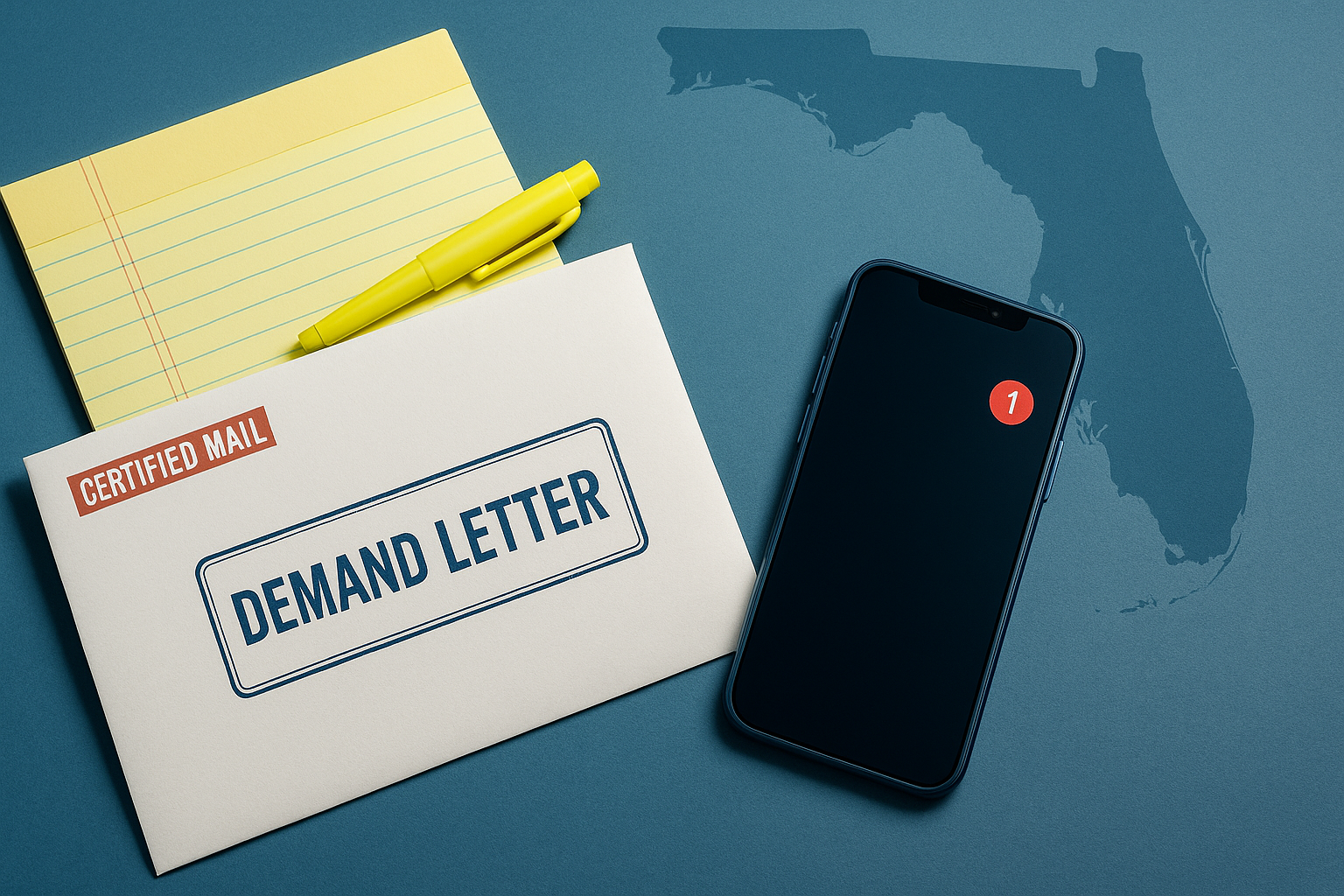If a demand letter just landed in your inbox or mailbox, don’t panic—and don’t ignore it. This guide explains what to do in the first 72 hours, the legal and business implications in Florida, and how our firm can craft a response that protects your leverage while aiming to resolve the dispute quickly and cost‑effectively.
Why demand letters matter
A demand letter is often the first concrete step before suit. How you respond can:
- Preserve defenses and insurance coverage.
- Prevent admissions or facts being used against you later.
- Set the tone for settlement—or push the sender to rethink filing.
Florida has several statutes that use demand letters or pre‑suit notices as part of the process (think construction‑defect notices, lien demands, civil theft notices, and landlord‑tenant disputes). Even when no statute requires a letter, many lawyers send one to “set the table” for fees or negotiations.
Goal: buy time, reduce risk, and collect facts—then deliver a tailored, non‑admission response that either resolves the issue or positions you for litigation on your terms.
First 72 Hours: What to do immediately
- Calendar any deadlines. Many letters set response dates. Certain statutes have fixed windows (e.g., 30‑day civil theft demand). Missing one can increase exposure.
- Stop direct back‑and‑forth. Avoid ad‑hoc emails, texts, or calls with the sender. Inform staff to route all inquiries through counsel.
- Preserve documents (ESI). Save emails, texts, invoices, contracts, photos, change orders, job logs, and social posts. Suspend routine deletion and notify key employees.
- Tender to insurance (where applicable). Commercial General Liability (CGL), Professional/E&O, D&O, cyber—notify carriers promptly to avoid coverage issues.
- Identify the claim type. Is it contract payment, construction lien/defect, business tort (defamation, interference), civil theft, non‑compete, or landlord‑tenant?
- Collect your exhibits. Contract and amendments; SOW/POs; proof of performance or delivery; payment ledger; notices and emails; photos; permits/inspections.
Know the letter you received (common Florida scenarios)
- Construction & contracting: non‑payment, change‑order disputes, lien demands, “sworn statement of account” issues, Chapter 558 defect notices.
- Civil theft / conversion notices: statutory 30‑day demand letters seeking treble damages (§ 772.11) and fees if not cured.
- Business defamation / retraction: demand to retract or remove statements; may include threats of injunctive relief and damages.
- Landlord‑tenant (commercial): rent default, property damage, holdover; often paired with notice to cure or quit.
- Open account / account stated: unpaid invoices and interest/fees claims.
Each category has different leverage points, proof issues, and settlement patterns. The correct response depends on the facts, documents, and your risk tolerance.
Strategic response options (choose deliberately)
- Information‑gathering reply: Request documents, itemized damages, legal basis, and proof of standing. Keeps you non‑committal while buying time.
- Substantive rebuttal (without admissions): Present key defenses with exhibits. Use careful language; preserve all rights and privileges.
- Cure/offer to settle: Narrow issues and propose a business solution (payment plan, repair/re‑performance, mutual walk‑away, confidentiality).
- Counter‑demand: If you have your own claims, set them out (briefly) with supporting materials. Consider a tolling agreement.
- Decline with explanation: When the claim is weak or misdirected (wrong party, limitations, conditions precedent not met), say so—precisely.
Pro tip: Avoid “kitchen‑sink” responses. Target the real issue, show you’re organized, and control the pace.
Common mistakes to avoid
- Admitting facts or liability in early emails or phone calls.
- Paying without a release or confidentiality/non‑disparagement protections.
- Bluffing or threatening positions you can’t sustain (it will backfire in court).
- Forgetting insurance notice (late notice = coverage fights).
- Ignoring statutory steps (e.g., mishandling a civil‑theft demand can escalate exposure).
When insurance may help (and how to preserve it)
- CGL for certain property damage claims tied to “occurrences.”
- Professional/E&O for professional services disputes.
- D&O for officer/director allegations.
- Cyber/Media for online defamation or data incidents. Action: Tender promptly, cooperate with appointed counsel, and coordinate defense strategy to avoid admissions that jeopardize coverage.
How our firm approaches demand letters (fast, focused, and practical)
Flat‑fee options are available for initial response packages. Typical workflow:
- Same‑day triage (review letter + key documents and a 20‑minute call).
- Strategy memo outlining defenses, exposure, and settlement posture.
- Tailored response (information request, rebuttal, or settlement proposal) with exhibits.
- Negotiation toward dismissal, payment plan, re‑performance, or structured settlement.
Serving Broward, Miami‑Dade, Palm Beach, and across Florida.
Ready to act?
- Upload your demand letter (PDF) for a same‑day review.
- Or call/text (954) 474‑4420 to speak with an attorney.

